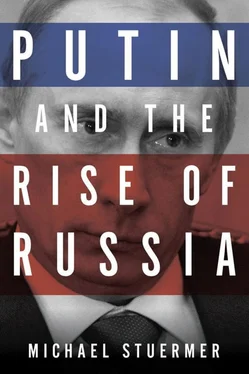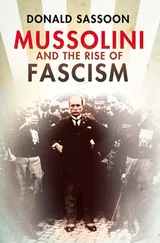May 2003:EU-Russia Summit in St Petersburg: definition of four ‘common spaces’ for cooperation Russia-EU
October 2003:Mikhail Khodorkovsky, CEO of YUKOS, taken into custody, sentenced for alleged tax fraud to eight years in prison
November 2003:Georgia’s ‘Rose Revolution’ and chagrin in Moscow
February 2004:Putin dismisses premier Mikhail Kasianov
September 2004:terrorists attack Beslan school, Ingushetia, North Caucasus
November-December 2004:‘Orange Revolution’ in Ukraine, souring of relations between Russia and the Yushchenko-team
January 2005:street protests against intended reform of ‘monetization’ of social benefits
December 2005:Gazprom raises gas price for Ukraine, briefly cutting off supply
July 2006:G-8 summit in St Petersburg
August 2006:ethnic clashes in the town of Kondopoga in Karelia
October 2006:Anna Politkovskaya, independent-minded columnist for Novaya Gazeta , murdered
10 February 2007:Munich Security Conference, Putin speaks out
30 November 2007:Shvartsman in interview with Kommersant spills the Kremlin beans
2nd December 2007:elections for Duma
12th December 2007:Putin endorses Dmitry Medvedev as successor
2nd March 2008:Medvedev elected president
7th May 2008:inauguration of Medvedev
ABM – Anti-Ballistic Missile (Treaty)
BTC Pipeline – Baku-Tiflis-Ceyhun Pipeline
CEO – Chief Executive Officer
CFE – Conventional Forces in Europe (Treaty)
CIS – Commonwealth of Independent States
CSCE – Conference for Security and Cooperation in Europe
EU – European Union
FSB – Federal’naya Sluzhba Beszopasnosti – Federal Security Service
IAEA – International Atomic Energy Agency, Vienna
ICBM – Intercontinental Ballistic Missile
IPO – Initial Public Offering
KGB – Komitet Gosudarstvennoy Bezopasnosti – Committee for State Security
LNG – Liquified Natural Gas
NAFTA – North American Free Trade Association
NATO – North Atlantic Treaty Organization
NGO – Non-Governmental Organization
NPT – Non-Proliferation Treaty
OECD – Organisation for Economic Cooperation and Development
OSCE – Organisation for Security and Cooperation in Europe
PCA – Partnership and Cooperation Agreement EU-Russia
PRC – People’s Republic of China
ROC – Russian Orthodox Church
SALT – Strategic Arms Limitation Treaty
SCO – Shanghai Cooperation Organization
SEC – Securities and Exchange Commission (US)
START – Strategic Arms Reduction Treaty
UN – United Nations
USD – US Dollar
WTO – World Trade Organisation
‘On entering the country of the Russians, you see at a glance that the social order as arranged by them can serve for their use only. You have to be Russian to live in Russia, although on the surface everything proceeds much as elsewhere. The difference is in fundamentals.’
Marquis de Custine,
Journey for Our Time
When, on a recent visit to Russia, I was hurrying through Moscow’s Kazan railway station, my eye caught sight of a tiny gold coin. On stopping to pick it up, I discovered that it was too light to be the real thing, only ten copecks, a mere nothing. But it was a carefully struck piece, with St George on horseback slaying the dragon. No more hammer and sickle to frighten the world, no more red stars to enlighten the world – orthodox Russia had reasserted itself, and the hallowed image of the saintly victor is now everywhere, adorning every uniform, even Mr Putin’s malachite inkwell, shielding the presidential palaces against intruders and signalling, in the guise of a return to the past, a journey into the unknown. One wonders what Lenin, his giant bronze statue in the central square of Tatarstan’s capital Kazan (he came from a place not far away called Uljanowsk) – still preaching to the invisible masses, or his giant profile in Berlin’s Behrenstrasse, once guarding the KGB headquarters in the now extinct German Democratic Republic, would have made of the return of St George to Russia.
It is not for the first time in the last two centuries that Russia leaves the world wondering about its destiny. Russia is, notwithstanding the losses incurred when the Soviet empire imploded upon itself, still the enormous country of eleven time zones from Kaliningrad Oblast on the Baltic Sea to the far eastern island of Sakhalin, a land of vast empty spaces full of promise, with a population of more than 140 million of whom 20 million are Muslim, looking at the crescent rising rather than the cross and the stars, suspecting that St George might not be their friend and protector. It is a power with vast military resources, among them more than 10,000 nuclear weapons in various configurations, an energy giant whose oil reserves will last, at present rates of exploitation, for more than thirty years, with enough natural gases for more than 180 years.
There is also the old Russian cultural and geopolitical ambiguity between Europe and Asia, and the new oscillation between weak elements of democracy and, invariably, strong elements of autocracy.
When it comes to world affairs, the question may well be asked whether Russia forms part of an emerging multipolar balance or is striving to have a say and, in particular, a veto in all major affairs around the globe, especially in Eastern Europe, the Caucasus, the Greater Middle East and Central Asia. Can Russia be persuaded from outside, beyond its manifest interests, to support those elements of the Pax Americana that continue to be regulators of globalization, like the World Trade Organization, the World Bank, the International Monetary Fund? Will Russia support what is left of world order after the demise of the Cold War and the accompanying global, nuclear and bipolar system that is no more? In a nutshell: Will yesterday’s revolutionary power become tomorrow’s stabilizer of the industrial and post-industrial world from, as envisaged after the fall of the Soviet Union, Vancouver to Vladivostok? Russia clearly has the potential to act one way or the other, to be a force for stability or a force for turmoil. So far it seems that the leaders of Russia have not yet decided. Which way they go depends, in no small degree, on the West, its cohesion, statecraft and understanding of Russia.
We are back to the question that, in the grim winter of 1940, was asked in Britain while the European continent belonged to the dictators, when Sir Winston Churchill famously said on BBC radio: ‘I cannot forecast to you the action of Russia. It is a riddle, wrapped in a mystery, inside an enigma.’ And then the British PM added, almost as an afterthought: ‘The only key is the national interest of Russia.’
So the question remains as to what today constitutes Russia’s national interest, and who is the man, or the power elite around him, to define and implement it. When Putin’s second term was about to end, it was not only the Russians who feared, after eight years of rising oil and gas revenues that brought modest gains for many and vast riches for a few, instability and insecurity. But the outside world, too, kept wondering who and what would follow after Putin: possibly, after a while, Putin himself, in a different incarnation? Whatever the answer, Russia is going, for better or for worse, through a defining moment. What are the implications for the rest of the world?
Читать дальше











